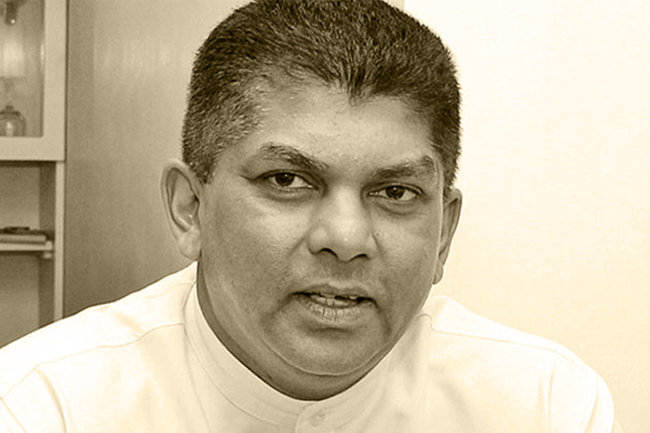-By LeN Political Correspondent

(Lanka-e-News -16.Aug.2025, 6.45 PM) When Lohan Ratwatte died earlier this month, some Sri Lankans breathed easier. For them, his passing was less a tragedy than a belated form of justice — a man who for decades appeared untouchable, shielded by family name and political privilege, had finally reached an end he could not escape.
Ratwatte was no ordinary scion. He was the son of General Anuruddha Ratwatte, one of the country’s most powerful politicians and a close ally of successive governments. But to his critics, he embodied the darkest collusion between politics, crime and impunity.
The shadow that has never left his name is the *Udathalawinna massacre of December 2001*, where ten young Muslim men were rounded up and shot dead in cold blood on election day. The killings, carried out near Kandy, shocked even a war-weary nation used to violence. Witnesses said the gunmen were linked to Lohan’s security detail. Though he was indicted, he walked free after years of procedural delays, witness intimidation and a trial that many human rights groups described as a charade.
The Udathalawinna massacre was not an isolated blot. Years before, Lohan’s name surfaced in another high-profile killing — the murder of *Joel Prera*, a Papua New Guinean rugby star, outside the Carlton Club casino in Colombo on May Day. Eyewitnesses, including Prera’s teammate Gideon Raka, alleged that Ratwatte was present at the scene when Pera was gunned down.
For nearly a month, police refused to name him as a suspect. Only after international outcry, and questions raised in Parliament by then-opposition leader Ranil Wickremesinghe, did investigators stir. Papua New Guinea’s government lodged formal protests. Sri Lankans working in Port Moresby reported hostility and fled home in fear of reprisals.
Yet, as in Udathalawinna, the investigations stumbled. The Criminal Investigation Department appeared more interested in producing a substitute “triggerman” than following the line of eyewitness testimony. “Justice,” one lawyer involved in the case remarked bitterly, “was being negotiated, not pursued.”
Inside Parliament, the affair became a matter of theatre. Gen. Ratwatte, himself a cabinet minister at the time, told the House he would never protect his son. Justice Minister G.L. Peiris spoke loftily of equality before the law, while simultaneously condemning “trial by media.”
But the suspicion — widely shared even within Colombo’s legal establishment — was that the case had been diluted deliberately. One senior police officer, now retired, told this newspaper: “The file was kept in a drawer until the newspapers forced our hand. That tells you everything.”
Lohan Ratwatte’s story is less about one man than about a culture. In Sri Lanka’s modern political history, the children of ministers and presidents have rarely been ordinary citizens. They have carried guns, issued threats, and in some cases pulled triggers — almost always without consequence.
To many, Ratwatte epitomised this impunity. His public persona was a cocktail of entitlement and menace: casinos, nightclubs, and the company of loyal armed guards. The state appeared to grant him a licence — not just to carry weapons, but to take lives.
Today, two decades later, the Udathalawinna families still grieve without closure. No senior figure has been held accountable. Human rights campaigners say that with Ratwatte’s death, the last hope of seeing him face meaningful justice is gone.
“The system protected him,” said a Colombo-based activist who worked with the victims’ families. “In another country, he would have been behind bars for life. Here, he lived large and died free.”
The Joel Prera case, too, remains an open wound. For Papua New Guinea, the episode scarred bilateral relations; for Sri Lanka, it exposed the fragility of its institutions under pressure from political clans.
Ratwatte’s death comes at a time when Sri Lanka is once again debating the role of political dynasties and their links to crime. The Rajapaksa family, once untouchable, has faced mass protests and forced exile. Yet critics argue the deeper rot — a state apparatus bent to protect the elite from accountability — remains firmly in place.
As one opposition MP put it this week: “Lohan Ratwatte did not act alone. He was the product of a system that gives the sons of ministers guns, guards and immunity. His licence to kill was issued by the State itself.”
The true tragedy may not be that Ratwatte escaped justice. It is that his victims never did. The ten men gunned down in Udathalawinna are now names etched on memorial stones. Joel Prera, once a celebrated athlete, is remembered in silence by his teammates.
And in Sri Lanka, where the powerful have long enjoyed more rights than the ordinary citizen, his death will not close the chapter. Instead, it serves as a reminder — that for decades, the law bent around him.
Lohan Ratwatte had a licence to kill. The question that lingers is how many others still hold one.
-By LeN Political Correspondent
---------------------------
by (2025-08-16 13:20:03)
Leave a Reply